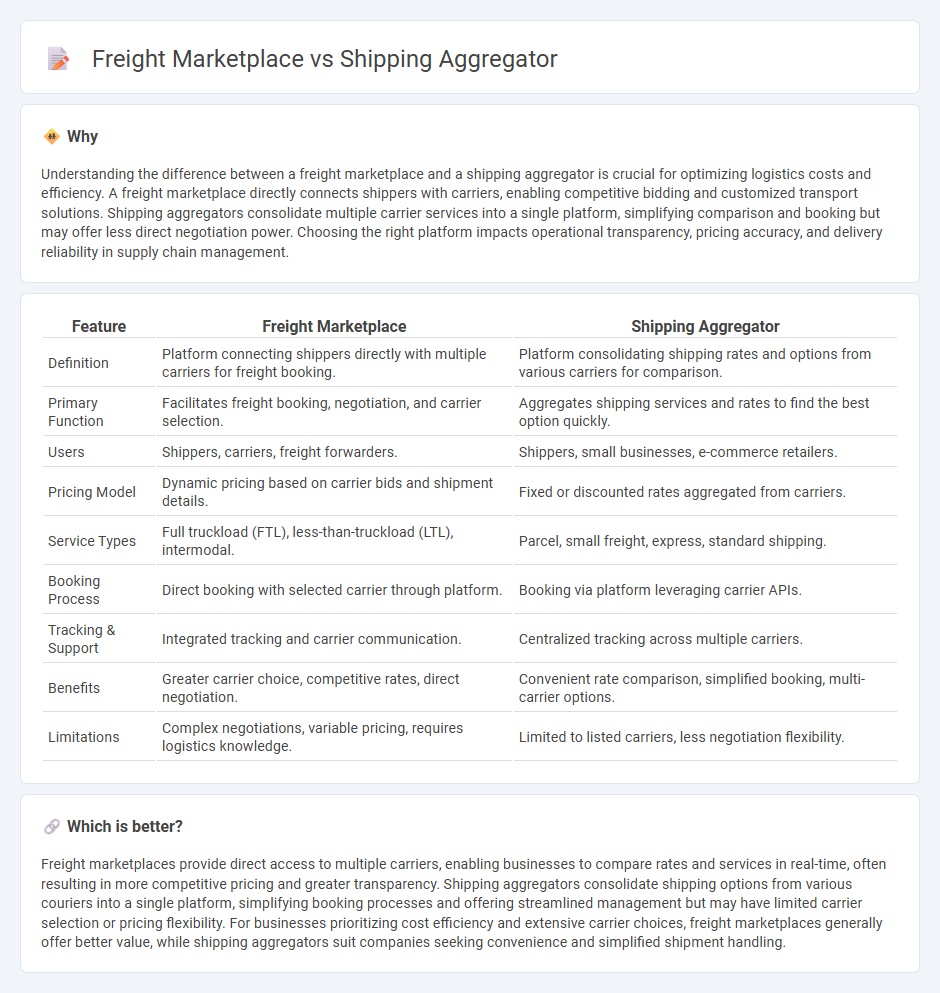
A freight marketplace connects shippers directly with carriers, offering real-time bidding and transparent pricing, while a shipping aggregator consolidates various shipping options from multiple carriers to provide a streamlined booking experience. Freight marketplaces often emphasize dynamic pricing and flexible carrier selection, whereas shipping aggregators focus on comparing rates and services for optimal convenience. Explore our detailed comparison to determine which solution best fits your logistics needs.
Why it is important
Understanding the difference between a freight marketplace and a shipping aggregator is crucial for optimizing logistics costs and efficiency. A freight marketplace directly connects shippers with carriers, enabling competitive bidding and customized transport solutions. Shipping aggregators consolidate multiple carrier services into a single platform, simplifying comparison and booking but may offer less direct negotiation power. Choosing the right platform impacts operational transparency, pricing accuracy, and delivery reliability in supply chain management.
Comparison Table
| Feature | Freight Marketplace | Shipping Aggregator |
|---|---|---|
| Definition | Platform connecting shippers directly with multiple carriers for freight booking. | Platform consolidating shipping rates and options from various carriers for comparison. |
| Primary Function | Facilitates freight booking, negotiation, and carrier selection. | Aggregates shipping services and rates to find the best option quickly. |
| Users | Shippers, carriers, freight forwarders. | Shippers, small businesses, e-commerce retailers. |
| Pricing Model | Dynamic pricing based on carrier bids and shipment details. | Fixed or discounted rates aggregated from carriers. |
| Service Types | Full truckload (FTL), less-than-truckload (LTL), intermodal. | Parcel, small freight, express, standard shipping. |
| Booking Process | Direct booking with selected carrier through platform. | Booking via platform leveraging carrier APIs. |
| Tracking & Support | Integrated tracking and carrier communication. | Centralized tracking across multiple carriers. |
| Benefits | Greater carrier choice, competitive rates, direct negotiation. | Convenient rate comparison, simplified booking, multi-carrier options. |
| Limitations | Complex negotiations, variable pricing, requires logistics knowledge. | Limited to listed carriers, less negotiation flexibility. |
Which is better?
Freight marketplaces provide direct access to multiple carriers, enabling businesses to compare rates and services in real-time, often resulting in more competitive pricing and greater transparency. Shipping aggregators consolidate shipping options from various couriers into a single platform, simplifying booking processes and offering streamlined management but may have limited carrier selection or pricing flexibility. For businesses prioritizing cost efficiency and extensive carrier choices, freight marketplaces generally offer better value, while shipping aggregators suit companies seeking convenience and simplified shipment handling.
Connection
Freight marketplaces and shipping aggregators are interconnected platforms that streamline logistics by consolidating multiple carrier options into a single interface. These systems enhance freight efficiency by providing real-time pricing, availability, and booking capabilities across various shipping providers. Integration of freight marketplaces with shipping aggregators enables businesses to optimize transportation routes, reduce costs, and improve shipment tracking through centralized digital solutions.
Key Terms
**Shipping Aggregator:**
Shipping aggregators consolidate multiple carrier options into a single platform, streamlining rate comparisons and booking processes for businesses seeking efficient logistics solutions. These platforms leverage extensive carrier networks and real-time data to offer competitive pricing and reliable tracking, enhancing supply chain visibility and cost control. Explore how shipping aggregators can transform your logistics management with comprehensive insights and tailored services.
Consolidation
Shipping aggregators consolidate multiple shipping options from various carriers into a single platform, enabling businesses to compare rates and services efficiently, while freight marketplaces connect shippers directly with carriers, emphasizing competitive bidding for individual freight loads. Consolidation in shipping aggregators leads to streamlined logistics management and cost savings by pooling shipments and optimizing routes, whereas freight marketplaces offer more flexible, on-demand load matching without inherent consolidation benefits. Explore how each model's consolidation approach can impact your supply chain efficiency and shipping costs.
Multi-carrier Management
Multi-carrier management in shipping aggregators involves consolidating various carrier options into a single platform, enabling streamlined rate comparisons, bookings, and tracking across multiple logistics providers. Freight marketplaces emphasize a dynamic environment where shippers directly connect with numerous carriers, fostering competitive pricing and flexible contract terms. Explore how multi-carrier management enhances efficiency and cost savings in modern shipping solutions.
Source and External Links
Shipping Aggregator: eCommerce Guide - A shipping aggregator is a platform that consolidates multiple shipping carriers and services, offering rate comparison, label printing, tracking, and analytics to simplify and optimize shipping processes for eCommerce businesses.
Which Shipping Aggregator Is Right for Your Business? - Shipping aggregators connect businesses with various carriers on one platform, enabling easy order fulfillment, cost-effective rates, and real-time tracking, with examples like Shipyaari integrating over 12 carriers and providing AI-based carrier recommendations.
ShipStation: Shipping Software for Ecommerce Fulfillment - ShipStation is a scalable shipping software that automates workflows, provides rate shopping among top carriers, tracks shipments, and enhances customer experience through branding and automation tools.
 dowidth.com
dowidth.com